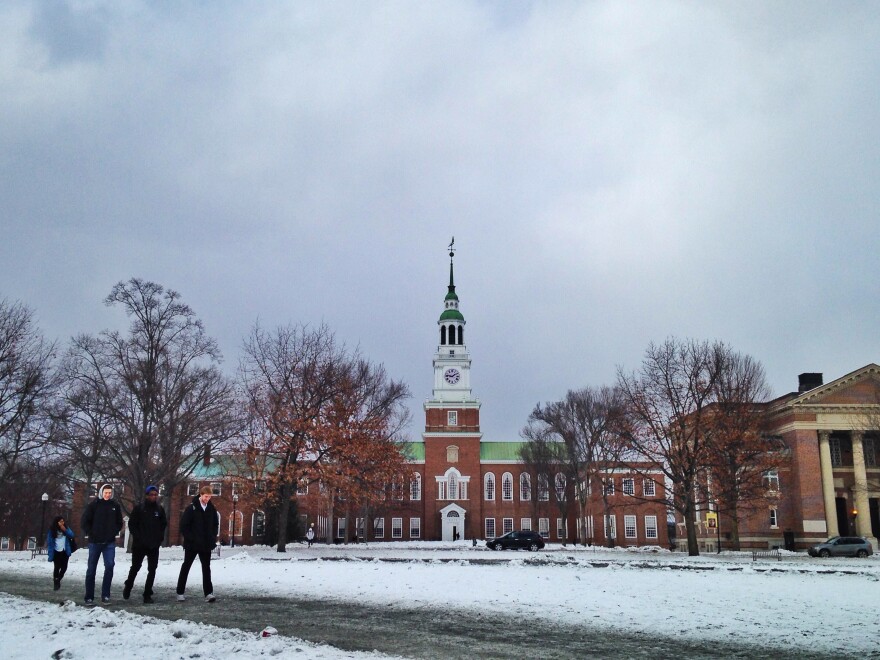The details laid out in a November legal complaint against Dartmouth College are shocking.
Seven women in the school's prestigious Psychological and Brain Sciences Department say they were harassed, assaulted, and even raped by tenured faculty members. They say administrators turned a blind eye, protecting the department’s reputation, and the men, at all costs.
In the months since, though Dartmouth disputes many of the allegations, the school's administrators have introduced a plan to address the complaint's core concerns: sexual harassment and abuse of power on campus.
It includes, among other things, a new sexual misconduct policy, mandatory online training for faculty and staff, reviews of all academic departments for cultural and equity concerns, more mental health counselors and additional resources for the college's Title IX office.
“I think done right this will be hugely meaningful for Dartmouth, and I hope it will be a model for other campuses,” Provost Joe Helble said in a recent interview. “We are committed to seeing this through and seeing this forward.”
Critics both on and off campus, though, say the plan doesn’t go far enough. Instead, they worry, it's a hollow promise for reform.
“Vague and unsatisfying” are the words used by Diana Whitney, a graduate of the college who says she was assaulted as a student in the 1990s.
“Great that there’s oversight, great that they’ve shown some intentions,” she said. “But really insufficient so far.”
She’s helping lead a group of alumni who see sexism as a long-running problem at Dartmouth -- not limited to this recent case in the psychology department -- and are lobbying for more aggressive action.
The group has issued several demands for Dartmouth's senior leaders, including an expansion of required trainings and more support for survivors. Whitney and others have emphasized their desire to see new victims’ advocate positions created, which they see as a needed independent resource for those who have experienced harassment or assault.
A faculty group organized under the American Association of University Professors has also emerged as a strong voice on these issues.
“We are getting involved, we are agitating, we are speaking and speaking out because we want the institution to do better,” said Jonathan Zinman, one of the group’s leaders.
He, too, would like to see changes to the administration’s proposal. The administration did not do enough to solicit input as the plan was crafted, he said, including from faculty and staff experts on harassment and sexual violence.
He also would like the school to undertake a comprehensive accounting of what went wrong in the psychology department to allow for such dramatic abuse.
“I think that’s important to do ethically," he said. "I think it’s important to do intellectually as an institution that values historical inquiry. And frankly, I think it’s the right thing to do strategically.”
Provost Helble said administrators did look at the past, at what went wrong, through the investigatory process after women came forward with formal complaints. As for whether any of that information would be shared, he said the school is limited in what it can disclose.
He said he’s glad people on and off campus are engaged. He wants faculty, students and alumni to know their voices are being heard. Already, he said, the administration has adjusted the online trainings they were using after some faculty members raised concerns that they perpetuated racist stereotypes.
Among those who still feel like they don’t have the administration’s full attention, though, are the seven women who filed the lawsuit.
Two of those women, Vassiki Chauhan and Sasha Brietzke, remain on campus working toward their graduate degrees. They say they are happy to see the school's leaders take action on these issues. In some cases, though, they say the goals don't go far enough or simply lack detail.
Of particular focus for Chauhan and Brietzke is the hiring of women and faculty of color, and not just in entry-level roles.
“People who can actually take risks in order to make change are people with power,” Chauhan said.
Diversity in hiring is among the administration’s priorities, but she would like to see the school set more ambitious goals.
In Dartmouth's psychology department specifically, men far outnumber women in senior positions. It’s frustrating to Chauhan that the college insists there’s no evidence of discrimination there, especially when some women who have left the department say sexism was rampant.
"There’s not any willingness to pay any sort of recognition to the fact that women’s lives were ruined by some of the actions that occurred on this campus, whose entire professional careers were derailed because of the actions on this campus,” Brietzke said.
Both she and Chauhan say the advice they got pre-lawsuit from other academics was to put their heads down and focus on their science -- that they could change the system once they safely got their degrees. She’s proud, though, they chose otherwise.
“The day-to-day is hard,” she said. “There’s some days that I don't feel like I can be productive or do science because I’m so distracted by the residual fallout from all of this.”
But if she can contribute to broader change, she said, it makes the struggle all the more worth it.







